噪声功率不确定性区间估计和降低SNR WALL恶化的能量检测算法
2014-05-29谢显中胡小峰
谢显中 胡小峰 马 彬
噪声功率不确定性区间估计和降低SNR WALL恶化的能量检测算法
谢显中 胡小峰*马 彬
(重庆邮电大学移动通信技术重庆市重点实验室/重庆邮电大学个人通信研究所 重庆 400065)
能量检测是认知无线电系统中广泛采用的空闲频谱检测方案,但其性能受到噪声功率不确定性(NPU)的严重影响。该文提出一种新颖的复杂度较低的NPU区间估计算法,并且从理论上分析了估计的噪声功率对能量检测信噪比墙(SNR WALL)恶化的影响,得出了SNR WALL恶化性定理。进一步基于门限修正提出一种改进的能量检测算法以消除SNR WALL恶化。仿真结果表明,该算法能较为精确地估计NPU区间,并且验证了SNR WALL恶化性定理的正确性;同时,改进的能量检测算法性能要优于稳健的统计方案(RSA)能量检测的结果,并且改进后降低了SNR WALL恶化,提高了检测的鲁棒性。
认知无线电;噪声功率不确定性(NPU);NPU区间估计;信噪比墙恶化;能量检测
1 引言


本文提出一种新的NPU区间估计算法,当噪声功率在NPU区间内服从均匀分布时,给出了NPU区间的闭合表达式。同时,理论上分析了估计的噪声功率对能量检测性能的影响,给出了SNR WALL恶化性定理。最后,基于SNR WALL恶化性定理,提出了一种改进的能量检测方案,以消除SNR WALL恶化。仿真表明:(1)本文算法能较为精确地估计出噪声功率的上、下限值;(2)验证了本文提出的SNR WALL恶化性定理的正确性;(3)改进的能量检测能够可靠地消除SNR WALL恶化,提高检测性能的鲁棒性。
2 系统模型
2.1 噪声功率不确定性区间模型
2.2 稳健的统计方案

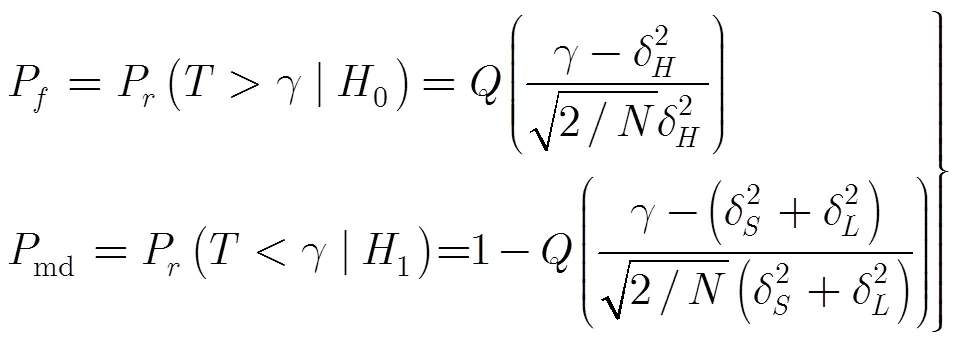
3 一种新的噪声功率不确定性区间估计算法
3.1 算法步骤
为了提高NPU环境下能量检测的性能,类似IEEE802.22草案,采用两步感知方案[13],包括精确感知和快速感知。在本文算法中精确感知周期担任两个功能角色:第一,执行比较精确的、复杂度较高的检测算法,以精确判断PU频段是否空闲;第二,当被检测频谱空闲时,利用本文提出的噪声功率估计算法,对功率上、下限值进行估计。由于噪声功率在数分钟内是保持不变的[5],因此,在精确感知周期中估计的噪声功率可以应用于快速感知周期能量检测门限的设定。算法具体步骤如下:



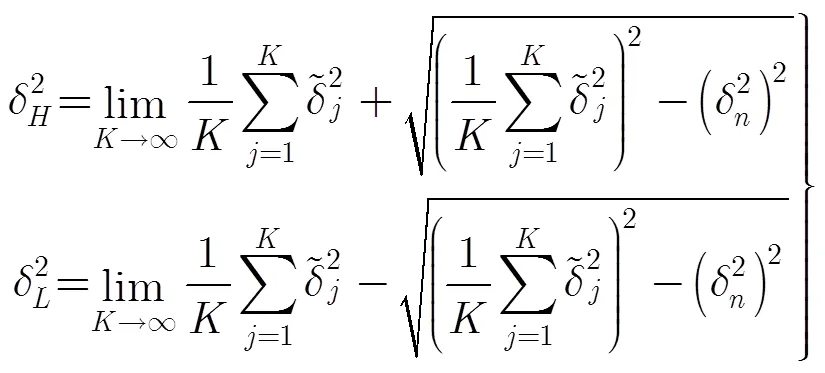
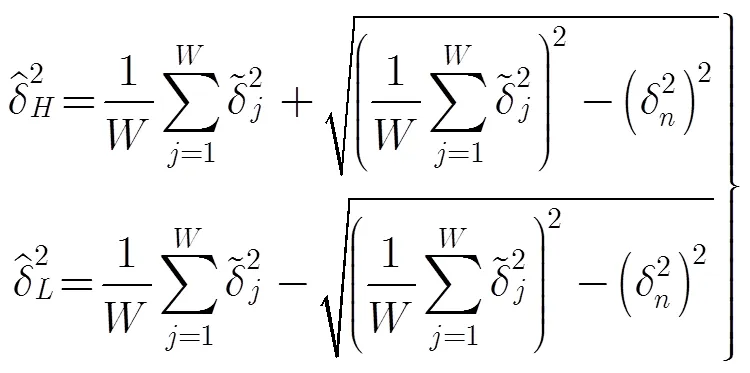
3.2 算法复杂度分析

4 SNR WALL恶化性定理与理论性能
4.1 信噪比及门限常数
根据式(1)可以得到采用RSA方案情况下,能量统计判决量近似服从正态分布:

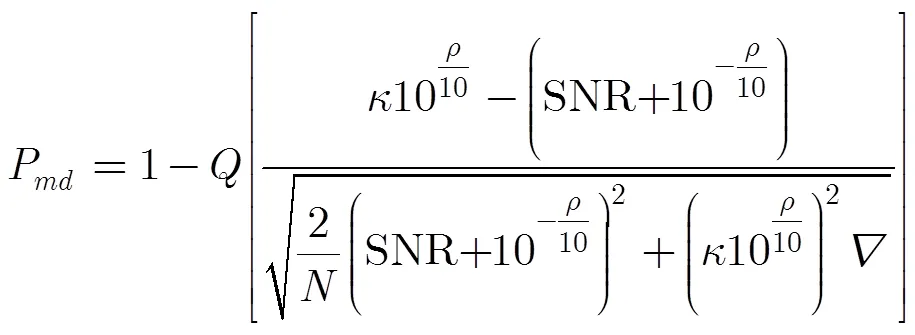

因此,虚警概率的理论表达式为

采用CFAR策略可以得到用估计的噪声功率去设定门限,门限常数变为
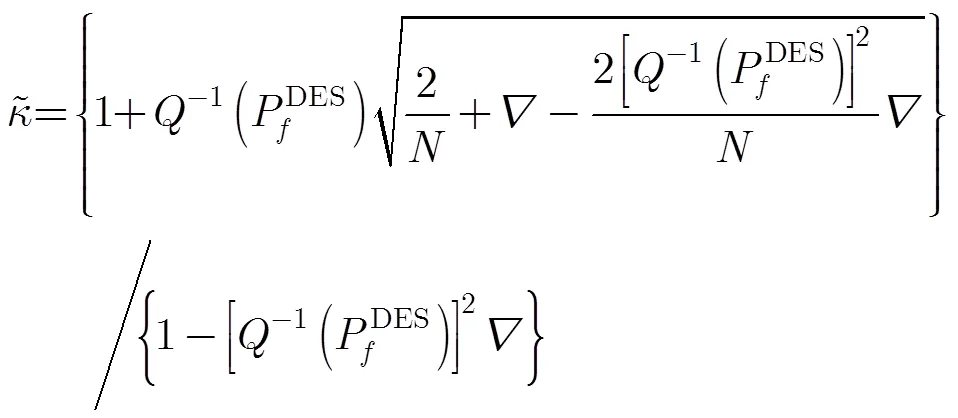
4.2NPU下SNR WALL恶化性定理


5 改进的能量检测算法


改进之后的漏检概率为


改进之后能量检测的SNR WALL为

6 性能仿真与分析




图2 NPU区间估计算法性能评估



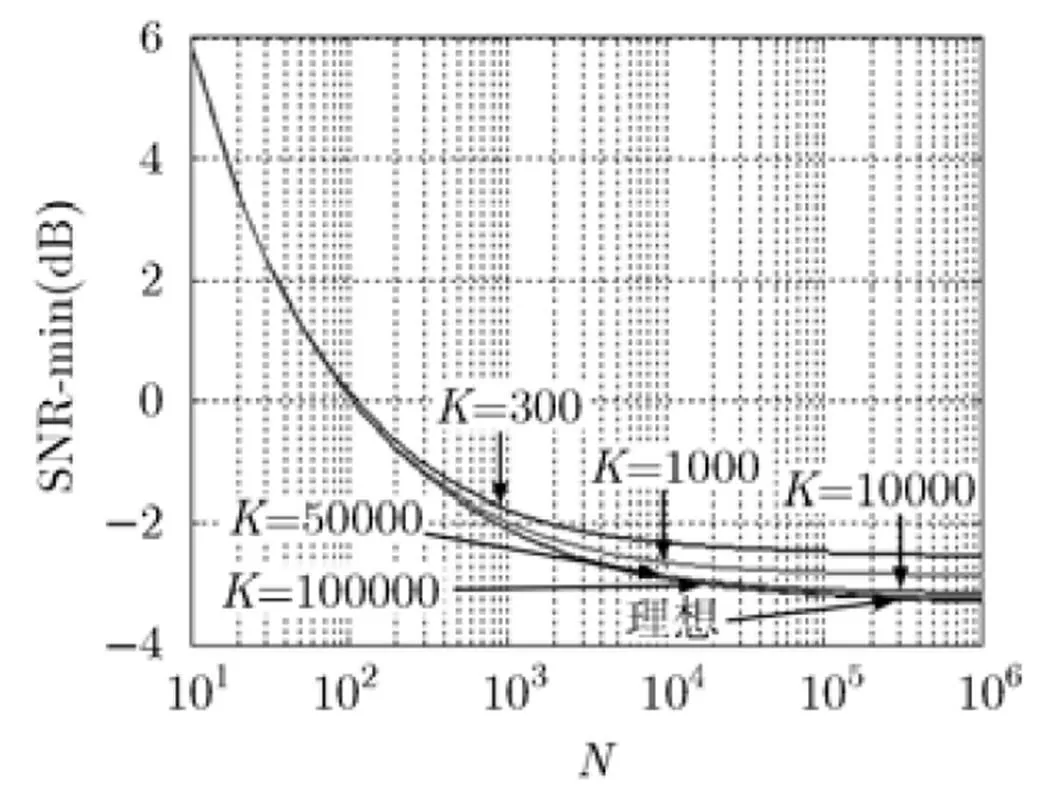
图3 最小信噪比随N的变化
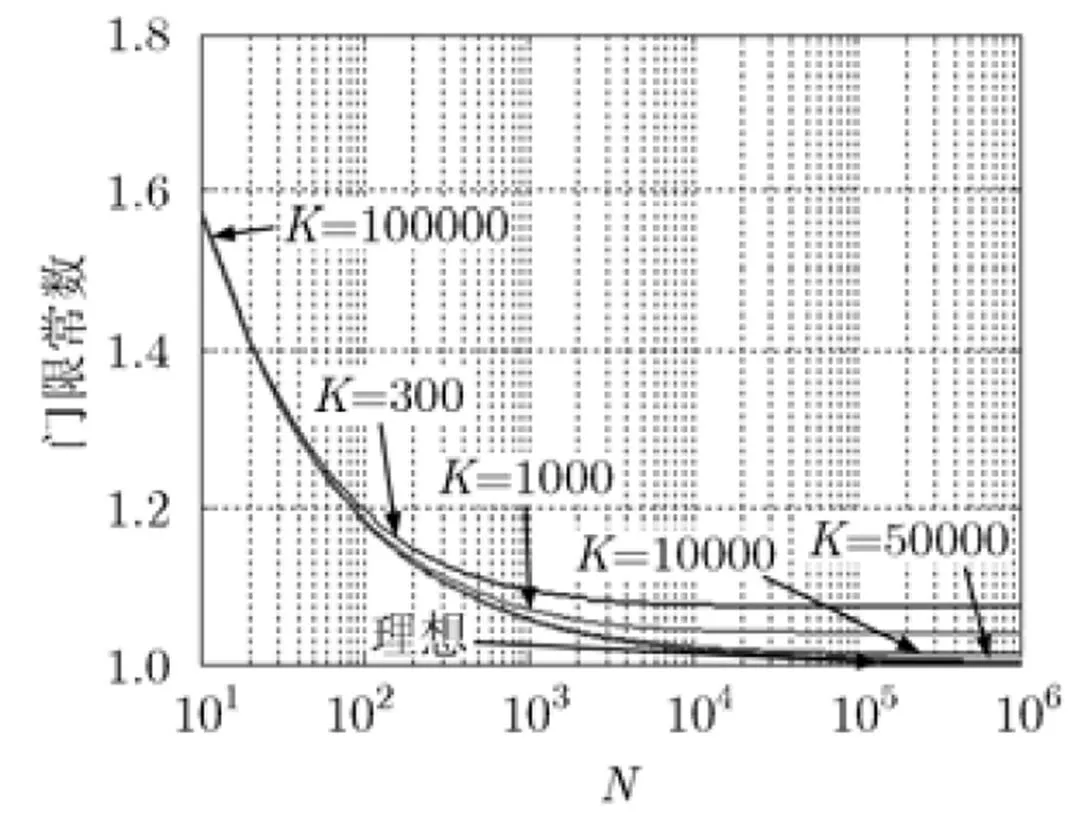
图4 门限常数随N的变化
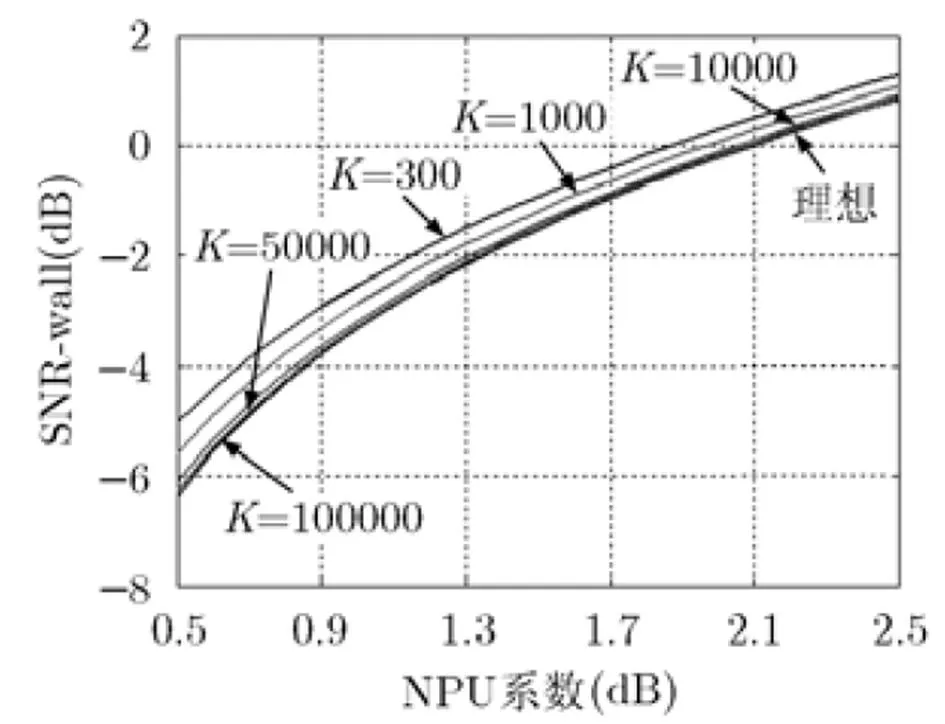
图5 SNR WALL随的变化
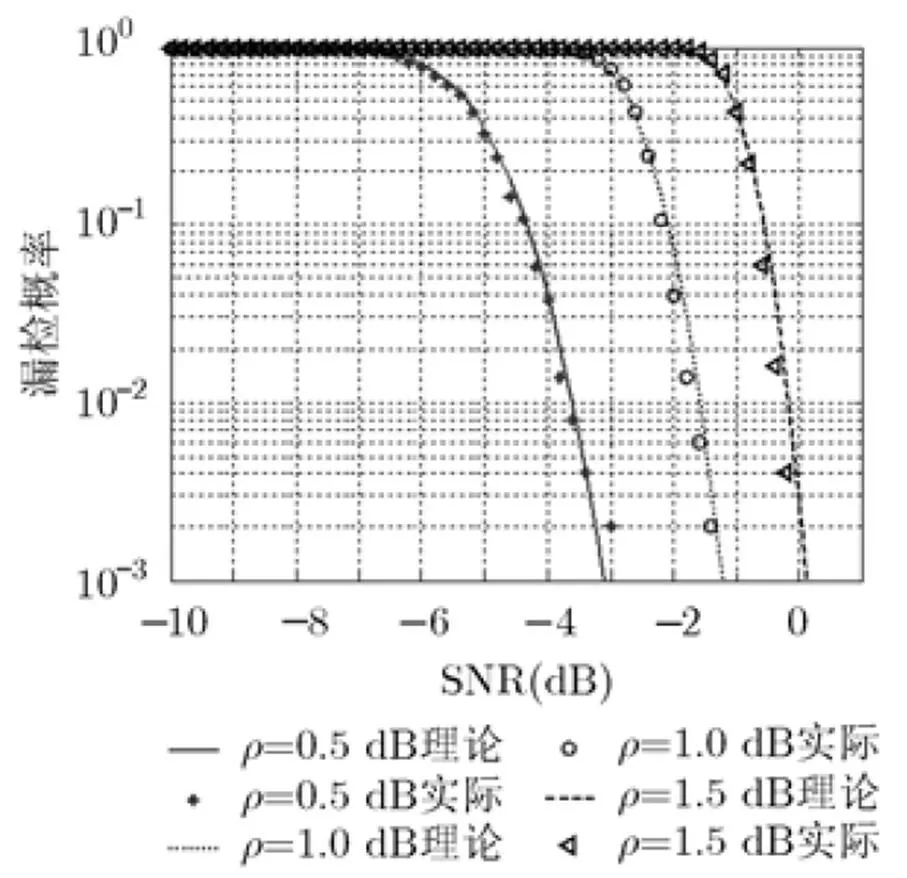
图6 随SNR的变化(N=1000)
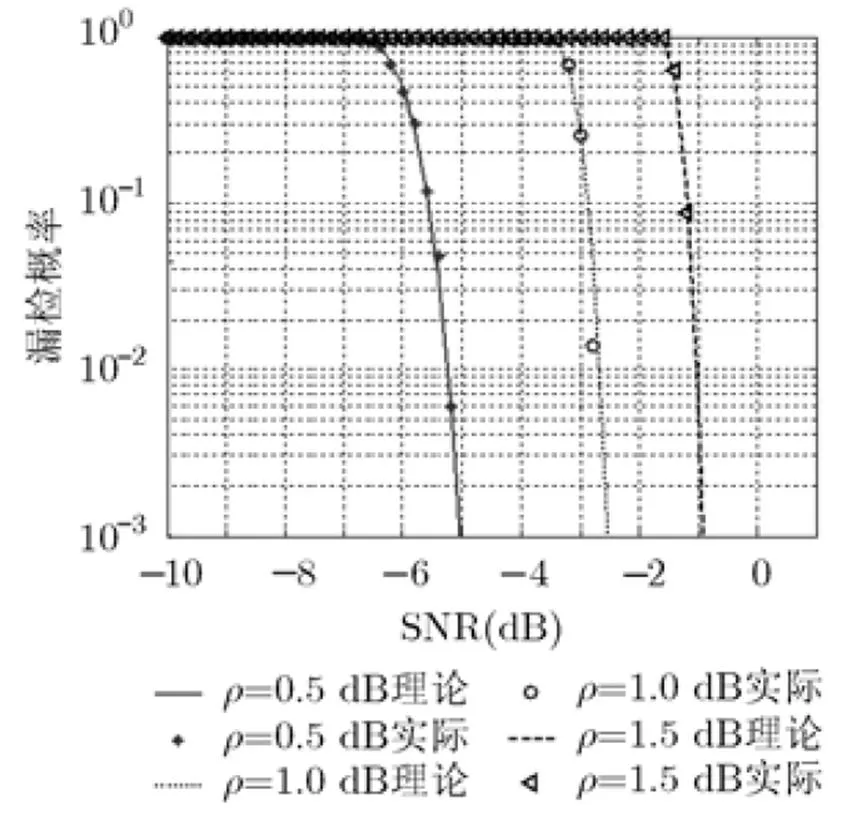
图7 随SNR的变化(N=10000)

图8 随SNR的变化(N=100000)

图9 随SNR的变化(N=1000000)

图10 改进方案SNR WALL随的变化
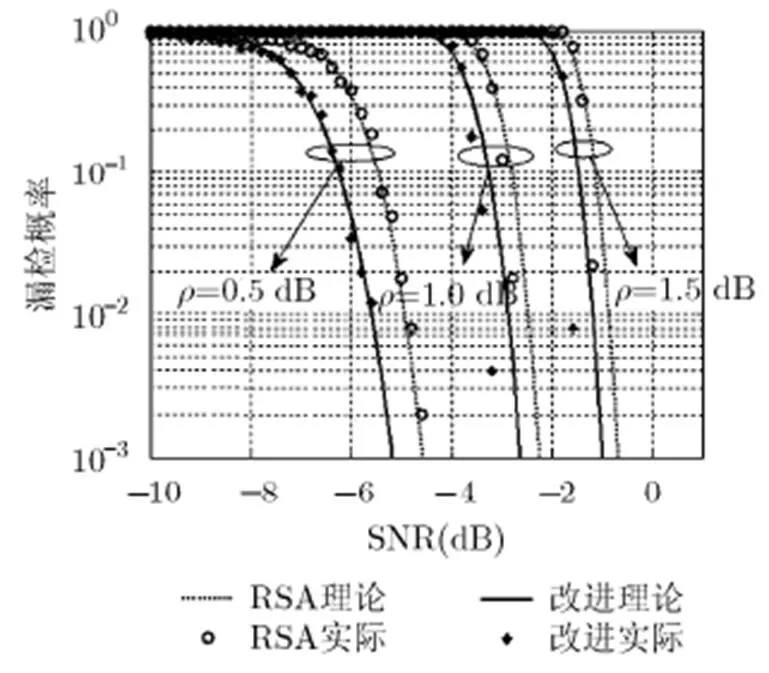
图11 改进前后随SNR的变化(K=1000)
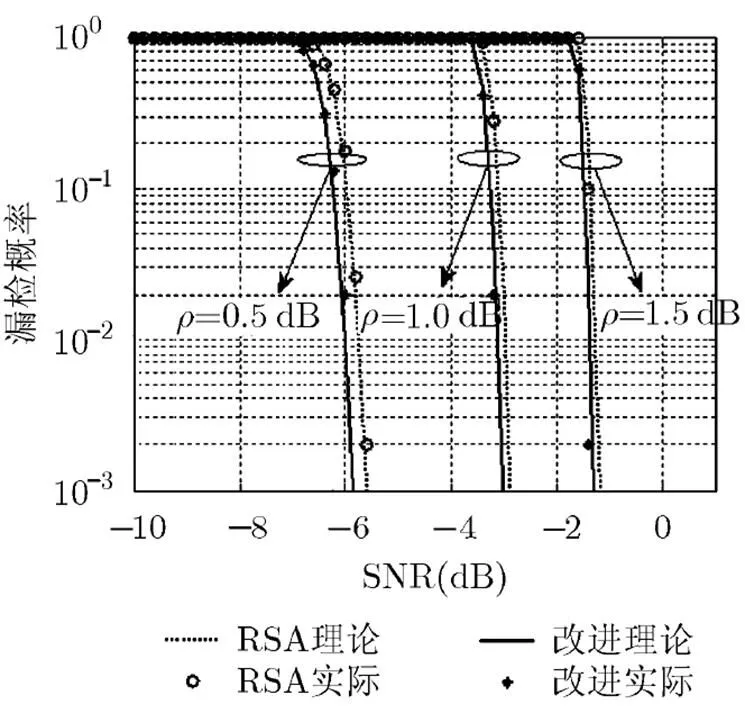
图12 改进前后随SNR的变化(K=10000)
7 结束语
针对能量检测受噪声功率不确定性(NPU)的影响,本文提出一种新的NPU区间估计算法,并且分析了NPU情况下噪声功率估计对能量检测性能的影响,给出了SNR WALL恶化性定理。通过设定门限常数,分析了SNR WALL恶化的原因,提出一种基于门限修正的能量检测算法,以克服噪声功率估计误差对检测性能的影响。仿真表明,本文理论分析和实际仿真结果一致,验证了本文理论分析的正确性;同时,本文提出的能量检测算法可以有效地消除SNR WALL恶化,提高了检测性能的鲁棒性。
[1] 衡玉龙, 黄天聪, 冯文江, 等. 有限用户数多认知网络部分信道共享性能分析[J]. 电子与信息学报, 2013, 35(2): 267-272.
Heng Yu-long, Huang Tian-cong, Feng Wen-jiang,.. Performance analysis on partial channel sharing of cognitive networks with finite user population[J].&, 2013, 35(2): 267-272.
[2] Hongjian S, Nallanathan A, Wang Cheng-xiang,.. Wideband spectrum sensing for cognitive radio networks: a survey[J]., 2013, 20(2): 74-81.
[3] Lopez-benitez M and Casadevall F.Signal uncertainty in spectrum sensing for cognitive radio[J]., 2013, 64(4): 1231-1241.
[4] Huang S, Chen H, Zhang Y,.. Sensing-energy tradeoff in cognitive radio networks with relays[J]., 2013, 7(1): 68-76.
[5] Andrea M, Andrea G, and Marco C. Effects of noise power estimation on energy detection for cognitive radio applications[J]., 2011, 59(12): 3410-3420.
[6] Shellhammer S and Tandra R. Performance of the power detector with noise uncertainty [OL]. http://www. ieee802. org/22/Meeting_documents/2006_July/22-06-0134-00-0000_Performanceof-the-power-detector-with-Noise-Uncertainty. ppt. 2013.
[7] Lim C H.Adaptive energy detection for spectrum sensing in unknown white gaussian noise[J]., 2012, 6(13): 1884-1889.
[8] Zhang Y, Zhang Q, and Wu S. Entropy-based robust spectrum sensing in cognitive radio[J]., 2010, 4(4): 428-436.
[9] Shen Lei, Wang Hai-quan, Zhang Wei,.. Blind spectrum sensing for cognitive radio channels with noise uncertainty[J]., 2011, 10(6): 1721-1724.
[10] Tandra R and Sahai A. Fundamental limits on detection in low SNR under noise uncertainty[C]. Proceedings of International Conference on Wireless Networks, Communications and Mobile Computing, Maui, 2005: 464-469.
[11] Tandra R and Sahai A. SNR walls for signal detection[J].,2008, 2(1): 4-17.
[12] 刘义贤, 季飞, 余华. 认知无线电网络中基于噪声功率估计的能量检测性能[J]. 电子与信息学报, 2011, 33(6): 1487-1491.
Liu Yi-xian, Ji Fei, and Yu Hua. Performance of energy detection based on estimated noise power in cognitive radio networks[J].&, 2011, 33(6): 1487-1491.
[13] IEEE Std P1900.6a/D0.5. IEEE draft standard for spectrum sensing interfaces and data structures for dynamic spectrum access and other advanced radio communication systems amendment: procedures, protocols and data archive enhanced interfaces [S]. 2013: 1-49.
[14] Kay S. Fundamentals of Statistical Signal Processing: Detection Theory[M]. New Jersey: Prentice-Hall, 1998: 20-35.
谢显中: 男,1966年生,博士,教授,研究方向为认知无线电、干扰对齐、预编码技术、通信信号处理等.
胡小峰: 男,1987年生,硕士生,研究方向为认知无线电、协作通信、移动通信技术等.
马 彬: 男,1978年生,博士生,副教授,研究方向为认知无线电、车载通信技术等.
Estimation of Noise Power Uncertainty Interval and Energy Detector with Lowering SNR WALL Deterioration
Xie Xian-zhong Hu Xiao-feng Ma Bin
(&,,400065)
Energy Detector (ED) is the most common way of idle spectrum sensing in cognitive radio. However, its performance may suffer seriously from the Noise Power Uncertainty (NPU). In this paper, a low computational algorithm is proposed to estimate the NPU interval, and the SNR WALL deterioration phenomenon with estimated noise power is analyzed theoretically. The SNR WALL deterioration theorems are obtained. In addition, a new ED algorithm based on modified threshold is proposed to eliminate SNR WALL deterioration. Numerical simulation results show that the proposed algorithm can estimate accurately the NPU interval, and verify the correctness of the SNR WALL deterioration theorems. Furthermore, both analytical and simulation results show that the proposed ED under NPU outperforms the ED of Robust Statistics Approach (RSA). The SNR WALL deterioration can be reduced effectively, hence improving the robustness of detection.
Cognitive Radio (CR); Noise Power Uncertainty (NPU); Estimation of NPU interval; SNR WALL deteriorating; Energy Detector (ED)
TN92
A
1009-5896(2014)02-0364-07
10.3724/SP.J.1146.2013.00928
胡小峰 huxfcqupt@163.com
2013-07-01收到,2013-10-11改回
国家自然科学基金(61271259, 61301123),重庆市自然科学基金(CTSC2011jjA40006),重庆市教委科学技术研究项目(KJ120501, KJ120502,KJ130536)和重庆市教委项目(Kjzh11206)资助课题
